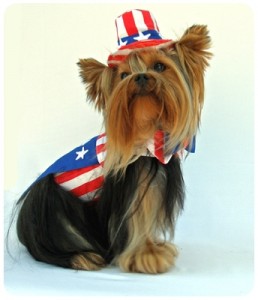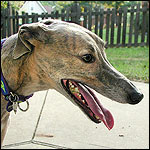Posts Tagged ‘Where: Jasper-GA’
 Declare Independence from Missing or Injured Pets
Declare Independence from Missing or Injured Pets
Los Angeles, CA – Firework displays and parties are American traditions on the Fourth of July, but pets can sometimes be startled by all the commotion of visitors and loud noises. Every Independence Day shelters fill with lost and injured pets. The Society for the Prevention of Cruelty to Animal Los Angeles (spcaLA) recommends taking these simple precautions to keep your pet happy and safe this July 4th:
- Dogs and cats should be microchipped and wear current ID tags at all times. This is the best way to ensure a happy reunion if your pet goes missing.
- Keep pets safe and secure inside your home. Loud noises from fireworks, can cause a dog to jump a fence and run away from home or a cat to hide for days. Keeping your pet indoors and secure will also keep them from dangerous roadways.
- If you’re hosting a party, keep your pets in a cool, well-ventilated room with a radio playing softly in the background. Include your pet’s favorite toys and pet bed for comfort. Do this as well if you are going out but your pet is staying in.
- Do not tie your dog up outside to keep him/her from escaping. The loud noise from the fireworks can frighten your pet making them more likely to attempt to flee. Dogs can seriously injure themselves, or even die, trying to escape.
- Educate children to not scare pets with firecrackers or sparklers.
Backyard barbeques are fun for the family, but dangers lurk for curious pets. Keep alcoholic beverages, lighter fluids, matches, and insect repellents like citronella candles away from your pets; each can be toxic or deadly when ingested or inhaled. If your pet requires sun protection, only use sunscreens intended for animals. Some foods are toxic for dogs like chocolate, onions, tomatoes, avocadoes and grapes. Cooked bones can splinter and be fatal.
Follow these precautions for a festive Fourth of July!
(http://spcala.com/newsreleases/2010/julyfourth.shtml)
By: Irreverent Vet
(http://www.petplace.com/dogs/the-irreverent-vet-speaks-out-on-dog-breeds-that-are-bad-with-cats/page1.aspx)
Our customer service department gets a lot of email from dog lovers about every type of question you can imagine about dogs.
Recently, they forwarded some emails they thought were suited to me, the Irreverent Veterinarian. They knew that I would speak the truth regardless if pet owners or other veterinarians liked it or not.
The email that I’ll address today is…
Dear PetPlace – I am a cat lover and my husband loves dogs. We have two cats that we adore and he really wants to add a dog to our family. My neighbor has a dog that recently killed a neighborhood cat that just makes me sick. I’ve asked a few people about which breeds are bad around cats and have not gotten a good answer. Can you give me your thoughts?
So…What dog breeds are especially bad or aggressive to cats?
To be honest, any dog has the potential to be good or bad around cats.
The dogs that are best around cats are dogs that are not predatory and were raised around cats. Especially, dogs raised and socialized around lots of different cats, including your cats.
Many dogs will be good around cats that they know. If a dog is raised with YOUR cats, they are often good with YOUR cats.
However, (this is important!) many dogs they have learned to accept and are good with your cats may be TERRIBLE around other cats. I know of several dogs that live with cats and are considered great with them that have killed other cats that come into their yards. I’m not sure if they don’t recognize these new animals as cats or they see them as prey to kill (especially when the cat runs).
If you adopt a puppy, you can socialize him around your cats and he will learn to live peacefully with them in most circumstances. It is always best to slowly introduce cats and dogs and do it while supervised. As you train your new dog and you encounter a new or different cat, carefully supervise the interaction and praise him when he behaves well.
If you choose an adult dog – many times their history may make it difficult to know how they are with cats. Some dogs chase anything that runs.
Which breeds are associated with being particularly bad?
- Greyhounds are particularly bad with cats. I suppose their training to chase the rabbit and then seeing a running cat makes it a difficult temptation. They have big mouths and long sharp teeth that can be lethal. This does not mean that ALL greyhounds are bad with cats but their instincts are generally not an ideal choice in a cat-loving household.
- Pit Bulls can be very bad with cats. I know they can be great dogs but I have probably seen more cats killed or seriously injured by pit bills than any other breed. I just talked to a friend that is an emergency veterinarian and asked him his opinion on dog breeds that are aggressive to cats. He said in the past month – he saw three critically injured cats (two of which died)– all from pill bulls.
- Jack Russell Terriers (recently their name has been changed to Parson Russell Terriers) seem to “enjoy” the chase and have injured or killed many cats.My Final ThoughtsAny dog can be good or bad around cats. Introduce any new dogs to your cat-loving household slowly and while supervised. Always ensure your cats have an “out” or a place to be safe and get away from the dog.That’s my opinion and that’s all I’ll say.
Feel free to disagree or give me your thoughts. Email me, I’m curious about what you think.
This article prompted several emails from dog and cat owners. To be balanced, I’d like to share some of those comments with you. To read these comments, go to: Owners Comments About Dog Breeds Bad with Cats.
Disclaimer
The Irreverent Vet is a columnist that regularly contributes to PetPlace.com. The goal is to add a balanced and alternative view of some controversial pet issues. As happens with all of us, veterinarians can’t say what they really think without offending some clients. This commentary allows vets to say what they think and give you, the pet owner, and the opportunity to consider another view. All opinions are those of the Politically Incorrect Vet and not the views of PetPlace.com and are not endorsed by PetPlace.com.

